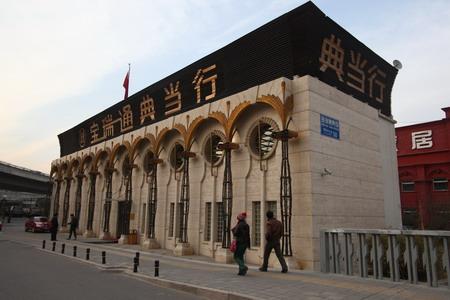 Pedestrians pass Bao Rui Tong Pawn Shop in Xibahe, Chaoyang district, yesterday. There has been an increase of the number of people pawning their apartments to secure quick cash to buy new properties before a tax exemption policy ends on Jan 1. [China Daily]
Pedestrians pass Bao Rui Tong Pawn Shop in Xibahe, Chaoyang district, yesterday. There has been an increase of the number of people pawning their apartments to secure quick cash to buy new properties before a tax exemption policy ends on Jan 1. [China Daily]There has been an increase in the number of Beijingers pawning their apartments as they attempt to secure quick cash to buy new properties before the end of a tax exemption policy on Jan 1, pawnbrokers say.
Anecdotal evidence suggests property hunters are offering apartments as collateral on short-term loans at pawnshops, which process loans faster than banks but have much higher interest rates of between 3-3.2 percent.
Peng Tao, property manager of Huaxia Pawnshop Co, said business had increased 50 percent since Nov 1, compared to the same period last year. Peng said many buyers were using this money to buy new properties.
Under the relief policy, sales of property purchased within five years are exempt from a 5.5 percent transfer tax. From Jan 1, the tax will be re-imposed on sales of property within two years of the purchase date.
"According to our statistics, an average of about seven to eight clients visit the shop every day and the number of clients that call us is about 10 to 15 each day," said Peng.
"It has become common to see clients waiting in the office to pawn their properties. I have been to local construction committees about six times in the recent week (to get approval to sell the property)," said Peng.
According to law, only people with full ownership of their properties can pawn them. Owners need to first get permission from the local construction committee.
A property pawn agent surnamed Zhu of Bao Rui Tong Pawn Shop said his staff of 20 had been overwhelmed by the sharp increase of people wanting to offload their properties.
"Some are going to check and investigate the properties and some are accompanying clients to local construction departments for registration procedures," Zhu said.
"There are so many people purchasing and selling their properties every day. Recently for the pawn registration, we have to wait at least two hours in a line of more than 100 people."
The People's Daily reported data showing sales on property purchased between two and five years ago accounts for 40 percent of current second-hand property trade.
A 45-year-old man surnamed Li, of Daxing district, said he pawned his 90-sq-m apartment for 500,000 yuan ($73,226.81) to raise money to buy a 130-sq-m apartment.
"If I can't raise enough money to buy this bigger apartment by the end of this year, I will need to pay an additional 71,500 yuan because of the transfer tax next year," said Li.
He paid a 3.2 percent interest rate on the loan, which amounts to 16,000 yuan, and believed it was a reasonable strategy to dodge the tax.
According to the Beijing Pawn Trade Association (BPTA), real estate deals account for between 60-70 percent of the pawn business.
"The clients who urgently need money prefer pawn shops rather than banks because they can raise funds in only a few days, while the procedure for banks takes at least one month," said Guo Jinshan, president of the BPTA.
Guo said the short-term interest rate of pawnshops was much higher than banks, which typically charge about 0.6 percent.





